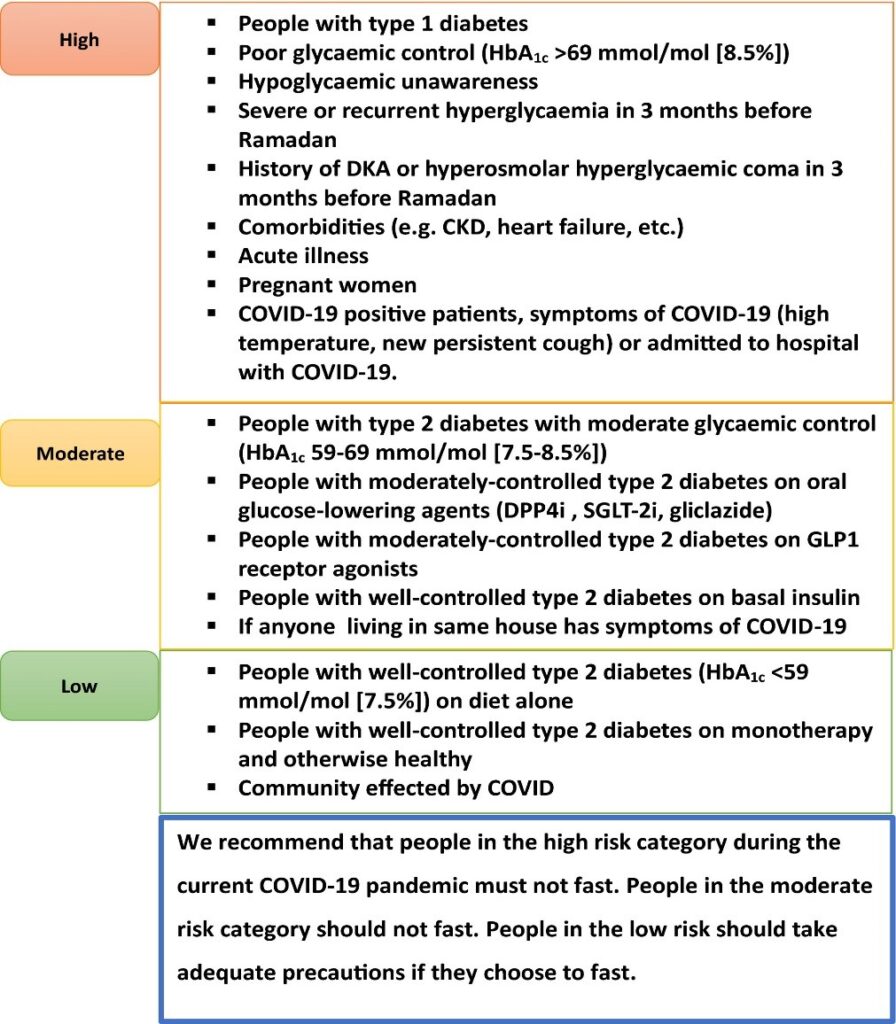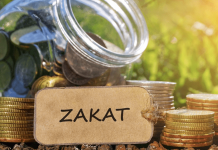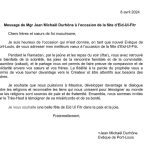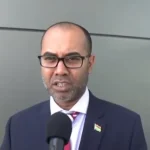Diabetes and fasting
The month of Ramadan is one of the five pillars of the Muslim faith. Muslims are obligated to keep daily fasts from dawn to sunset, with exemptions for those who are pregnant, lactating, travelling, or have any acute or chronic health conditions (where fasting may place them at risk of ill health). Although it is not mandatory for diabetic Muslims to fast but many will still choose to fast for spiritual, social and cultural reasons. The Epidemiology of Diabetes and Ramadan (EPIDIAR) surveyed over 12000 people with diabetes in 13 Islamic countries and found about 43% of people with Type 1 Diabetes Mellitus and 79% of people with Type 2 Diabetes Mellitus will fast during Ramadan. Similarly, Muslims who suffers from COVID-19 infections or any other acute/chronic illness that can put their lives at risks are exempted from fasting but may choose to do so regardless.
Covid-19 symptoms to be aware
There are about 20 symptoms suggestive of covid-19 infection as per THE COVID SYMPTOM STUDY (https://covid.joinzoe.com/post/the-20-symptoms-of-covid-19-to-watch-out-for) besides the common ones such as fever, persistent cough, loss of taste and smell and breathlessness. Know them, recognise them and talk to your doctor if you experience them.
Health implications for diabetic patients whilst observing fasting
Refraining from eating and drinking among diabetics can place them at higher risk of complications such as hypoglycaemia (low capillary blood glucose< 3.9mmol/L), hyperglycaemia with ketoacidosis (high capillary blood glucose> 16.6mmol/L together with acid remaining when the body burns its own fat) and cardiovascular complications which may be exacerbated with COVID-19 infection.
How to best support people with diabetes who intend to fast during Ramadan during this second wave of COVID-19 in Mauritius?
The prevalence of KNOWN DIABETES in adults aged 25-74 years as per the NCD MAURITIUS survey report in 2015 was 22.8% whilst that of PRE-DIABETES in the same category and age group was 14.2% (more women than men). There are certain risk factors that are associated with more severe covid-19 disease such as increasing age, male sex, cardiovascular disease, renal disease, hypertension and diabetes requiring ventilation on ICU.
The SOUTH ASIAN HEALTH FOUNDATION in UK has updated its guidance to help Muslims with diabetes who intend to fast during the covid-19 pandemic. Diabetes on its own is associated with two-fold higher risk of severe covid-19 disease and mortality.
There is increased risk of hypoglycaemia, hyperglycaemia, diabetic ketoacidosis, dehydration, acute kidney injury, hyperosmolar hyperglycaemic state and formation of blood clots in people with diabetes who are fasting during Ramadan and concurrent COVID-19 infection that subsequently may precipitate or exacerbate these complications.
Type 2 DM patients with Covid-19 infection may present with diabetic ketoacidosis, hyperosmolar hyperglycaemic state (HHS) and euglycaemic ketoacidosis whether they are on insulin or not. Fasting on its own or contracting covid-19 may precipitate these complications.
The SOUTH ASIAN HEALTH FOUNDATION published a risk stratification for people with diabetes and these guidelines are freely available for health professionals, general public and Islamic scholars in Mauritius to read and advice. I have tabulated them below :

The same association recommends that people with high risk MUST not fast, those with moderate risk SHOULD not fast and those with low risk to take necessary precautions if they CHOOSE to fast. Please note that these are in context of an ongoing COVID-19 pandemic and the moderate to high-risk diabetic patients are encouraged to speak with their own diabetologists together with their families for their individualised diabetes management and seek spiritual guidance from well versed Mauritian Islamic scholars if they intend to fast during this pandemic.
Blood glucose monitoring during fasting
It is advised to check finger prick blood glucose at least four times a day during fasting after wiping the finger clean and dry. The timings are before Suhoor, two hours into the fast, just before Iftar and two hours after Iftar. If they develop covid-19 symptoms check blood glucose every 2- 4 hours along with ketones.
When to break the fast (either any of them or combination of)
- Hypoglycaemia (blood glucose < 3.9)
- Hyperglycaemia (blood glucose > 16.6)
- Dehydration
- Any acute illness and unwell feeling including Covid-19 symptoms
People with T1DM who are fasting during the pandemic
- High risk of complications and recommended not to observe fast.
- If they fast; to check their blood glucose at least 4 times per day and ensure adequate clear unsweetened 2-3 Litres of water intake during non-fasting hours along with close adherence of infection control measures such as social distancing, face masks, avoid congregational prayers at mosque and frequent hand washing.
- If experiencing covid-19 symptoms, break the fast, check blood glucose every 2- 4 hours along with ketones and seek medical help immediately.
People with T2DM who are fasting during this pandemic
- Need to be very careful depending on whether one fall in the moderate or low risk category group as tabulated before.
- Avoid hypoglycaemia during fasting
- Avoid post meals hyperglycaemia
- Avoid weight gain and dehydration
- Close adherence of the infection control measures as set by the government.
Nutritional and exercise plan during this pandemic
- Incorporate food with low glycaemic index
- Avoid large processed carbohydrates and sugars at meals especially at Iftar
- Eat Suhoor as late as possible
- Rehydrate well with water or unsweetened fluids during non-fasting hours
- During Ramadan, Muslims are less physically active and recommended to perform light exercise at home/garden to avoid weight gain while following infection control measures and government guidance.
- Avoid strenuous exercise especially few hours before iftar.
Management of medications used in diabetes during Covid-19 whilst fasting
- Metformin
- Normally doesn’t require change of doses except in deteriorating kidney function
- Can have them at Suhoor and Iftar- consult your own doctor
- Stop metformin if dehydrated, acute illness including covid-19 symptoms, break the fast, rehydrate and consult your doctor
- Glicazide/Glibenclamide/ Glimepiride
- Avoid Glibenclamide whilst fasting
- Once daily dose should be taken at iftar
- If taking twice daily doses, please reduce the one at Suhoor
- If experiencing Covid-19 symptoms, breakfast, speak to your doctor to continue these medications whilst check blood glucose more often
- Linagliptin/Sitagliptin/Alogliptin/Saxagliptin
- No dose adjustment
- Can be continued whilst observing fast and if even develops Covid-19 symptoms
- If unwell, seek medical attention
- Dapaglifozin/Canaglifozin/Empaglifozin
- Reduced risk of cardiovascular and renal disease in T2DM
- Reduce weight and blood pressure
- No dose adjustment whilst fasting
- Greater risk of dehydration in hot climate whilst fasting
- If having covid-19 symptoms whilst fasting can develop acute kidney injury, risk of dehydration, severe covid-19 disease and ketoacidosis- Therefore break the fast, rehydrate, check blood glucose with ketones more often and talk to your doctor immediately.
- Pioglitazone/Rosiglitazone
- No dose modifications whilst fasting and taken at Iftar
- Break the fast if experiencing covid-19 symptoms and but can carry on with the medication after speaking with your own doctor.
- Continue rehydration and finger prick check 4-6 hourly
- Liraglutide/ Exenatide/Semaglutide injectables
- No dose modification
- Help to reduce weight and reduce cardiovascular risk
- Can continue whilst fasting but if experiencing Covid-19 symptoms; stop the medication if severe symptoms, break the fast, speak to your doctor, rehydrate and check your blood glucose often.
- Insulin
- These injections cause hypoglycaemia
- Must be adjusted with the help of your own diabetologists on basis of previous glycaemic control, diet, exercise, occupation, blood glucose monitoring frequency and age
- The pre-suhoor time injection dose can at times be reduced up to 50% whilst may keep the pre- iftar injection dose at the same value but at discretion of you own diabetologist.
- If develop covid-19 symptoms, break the fast, rehydrate, check glucose and ketones at least every 2-4 hours, follow government guidelines, continue insulin and other advisable diabetes medications and speak urgently with your doctor
Management of other medications in people with diabetes fasting during Ramadan
Any diabetic person who is acutely unwell (including covid-19 infection) with kidney function deterioration and evidence of dehydration need to stop various classes of medications including blood pressure tablets, analgesics and other diabetic medications. Please speak urgently to your doctor.
What happen when a diabetic person who is fasting becomes acutely unwell with other illnesses including COVID-19?
Despite no food whilst fasting, the person will experience high blood glucose if unwell due to release of stress hormones. One must seek medical help immediately after breaking his fast/her fast and observe strict infection control measures with strict adherence to governmental policies.
In those patients with covid-19 and diabetes whether Type 1 or Type 2; such patients are prone to develop diabetes ketoacidosis, severe hyperglycaemic state with dehydration and significant insulin resistance thus may need very high doses of insulin to get their blood glucose controlled even at hospitals and not to forget the steroids that are currently being used to treat severe Covid cases would again shoot such patient’s blood glucose sky high even during convalescence period.
Vaccination and diabetes
I have myself recommended/suggested my loved ones to have them done whether diabetic (more important) or non-diabetic if no contraindications.
Diabetic people may experience a surge in their blood glucose level following the vaccine. Please monitor your blood glucose ideally four times a day (before breakfast, before lunch, before dinner and before bed time), drink plenty of water if not restricted for your case and this transient raised blood glucose levels usually settle in next 36 hours.
Disclaimer: This article attempts to summarize in simple terms evidence from peer-reviewed papers and guidance published by internationally recognised medical journals to help those who fast during this pandemic. These are freely available online to the general public through a simple Google search.
By Dr. M. Shaan Goonoo
Specialist Registrar in Diabetes, Endocrinology
and General Internal Medicine in the UK




![[Message de l’Eid-Ul-Fitr 2024] Atteindre la piété… Et après ???](https://sundaytimesmauritius.com/wp-content/uploads/2023/10/Bashir-new-218x150.jpg)


![[Democracy Watch Mauritius] The Rwanda genocide started 7th April 1994, 30 years ago. Has humankind learnt the lesson? Consider Israel’s action in GAZA today!](https://sundaytimesmauritius.com/wp-content/uploads/2024/03/democracy_0-218x150.jpg)

![[Mer Rouge] Le Mouvement Anti-Pollution s’oppose à l’implémentation d’une raffinerie de graphite](https://sundaytimesmauritius.com/wp-content/uploads/2024/04/Mer-Rouge-150x150.jpg)



![[Mer Rouge] Le Mouvement Anti-Pollution s’oppose à l’implémentation d’une raffinerie de graphite](https://sundaytimesmauritius.com/wp-content/uploads/2024/04/Mer-Rouge-100x70.jpg)

